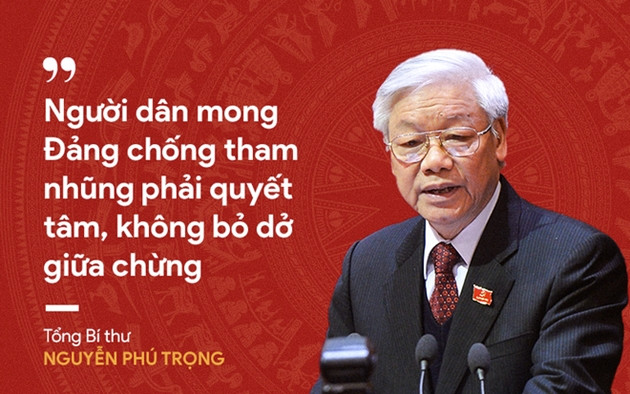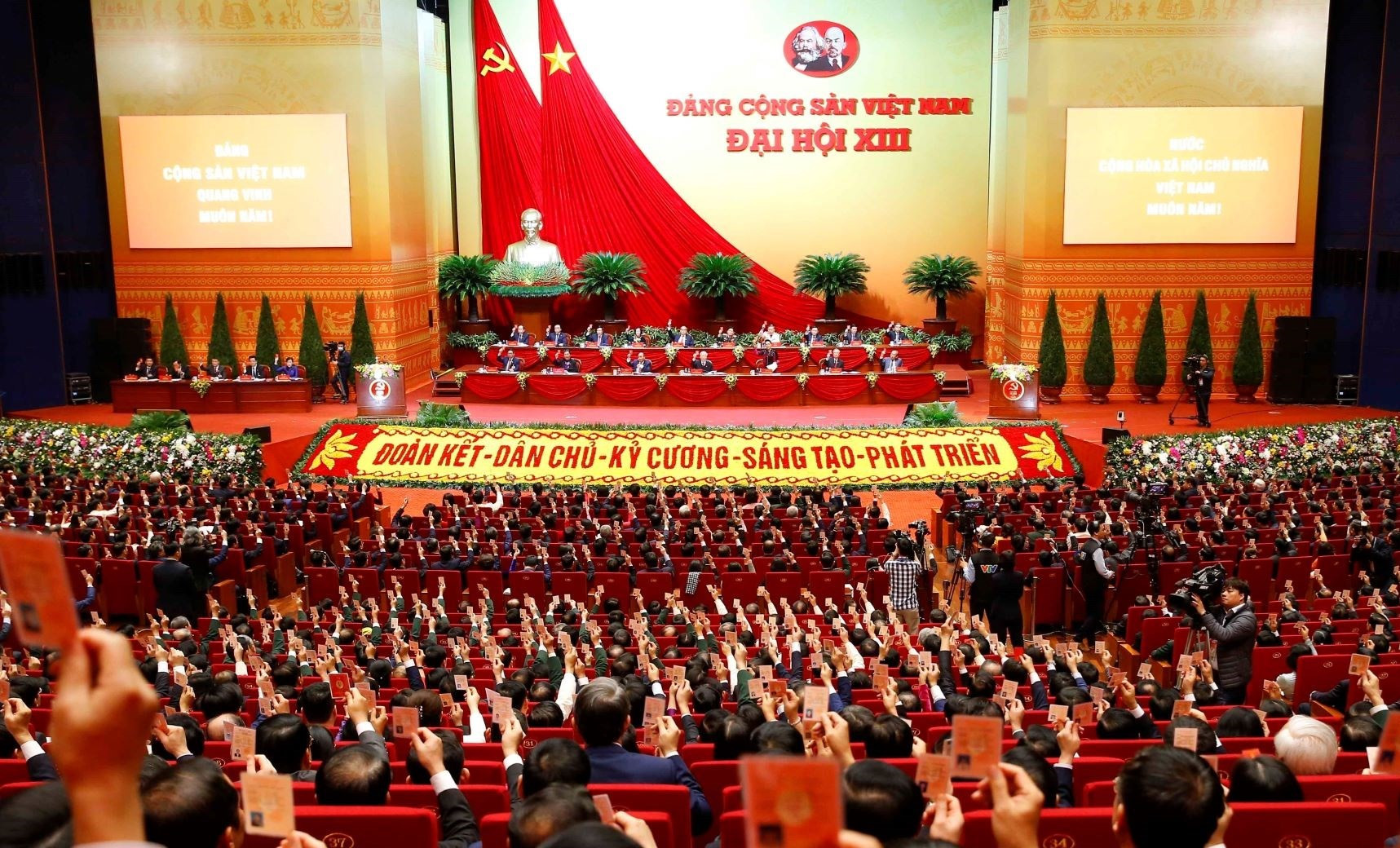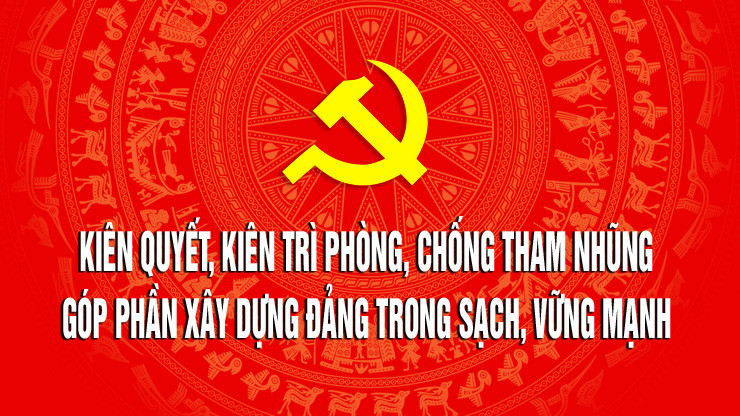Fight corruption to make our Party stronger!
(Baonghean.vn) - In recent times, it cannot be denied that our fight against corruption has had many positive movements. A strong party is one that dares to dissect the boils in its own body; the fierce fight against corruption not only does not weaken our Party, but also makes it significantly stronger, consolidating the trust of the people.
“MULTI-PARTY TO FIGHT CORRUPTION” - DISTORTED ARGUMENT,
anti-science
Hostile forces and those who oppose our Party and State have repeatedly claimed on the Internet that only regimes led by a single party have corruption, so it is necessary to implement multi-party system to fight corruption.
Let's approach this issue from two angles, scientific and political.
What is corruption? In political science, people give officials and civil servants power, so that they can exercise that power to serve the people's interests. In the process of performing public duties, a group of officials and civil servants use the power given by the people to seek personal benefits, for their families, friends, etc. Thus, public power has turned into private power, in science it is called power degeneration.
This degeneration of power takes place in every state, in every social regime, regardless of whether it is one-party or multi-party. Wherever there is a state, there is a risk of public power turning into private power. As long as the state exists, that risk will exist.
Politically, the argument that only a one-party regime has corruption, that to fight corruption there must be a multi-party system, and that Article 4 of the Constitution (of our country) must be abolished, is completely deceitful and contrary to the truth.
For example, the French Republic is considered a model of so-called Western, multi-party democracy, but in 2006, when he was the Minister of the Interior and running for the French presidency, Mr. Nicolas Sarkozy also received 5 million USD in bribes. Last year, the French judiciary had to deal with and imprison him.
Or in July 2017, the Pakistani Parliament removed Prime Minister Nawaz Sharif from office, citing corruption charges.
Besides Vietnam, Malaysia follows the Western model of multi-party democracy, but former Prime Minister Najib Razak, his wife and son were all involved in corruption, and then in 2018, Mr. Mahathir Mohamad returned to become Prime Minister, dealing with this shocking scandal.
And the most typical model in East Asia is South Korea, 100% European-American style, but 3 generations of South Korean presidents have been imprisoned for corruption.
Therefore, it can be said that corruption is a “disease” of the state. If there is a state, there is corruption, but the difference is only in the severity. Whoever takes advantage of the Internet and social networks to distort that only one party is corrupt is unscientific and has very bad political intentions, wanting to turn black into white, wanting to distort the truth, wanting to sow discord and provoke people's reaction to the Party.
When using the Internet and social networks, we need to be extremely vigilant against this false, distorted, and even reactionary information.
POSITIVE MOVEMENTS
 |
| General Secretary Nguyen Phu Trong talks about anti-corruption work. |
Like the rest of the world, corruption has been present in Vietnam for a long time, even since the anti-French resistance war in the 50s of the last century. We recall the case of Tran Du Chau - the then Director of the Military Logistics Department, who embezzled public property, stole public property and turned it into private property, living a strange life. President Ho Chi Minh had to stay up all night to decide to sign the death sentence for Tran Du Chau.
But to be honest, during the two resistance wars against the French and the Americans, all the people, cadres and party members were sent to the front to fight against foreign invaders. With the optimistic thought that “the road to the battlefield this season is very beautiful”, high-ranking cadres also carried their backpacks to the front. In such arduous resistance conditions, corruption was almost negligible, if not non-existent.
Since our country entered the process of innovation, developing a socialist-oriented market economy, encouraging personal interests in compliance with the law, among hundreds of thousands of officials, there have been dozens of officials who have taken advantage of being given greater authority than before.
In other words, in the centralized bureaucratic mechanism, officials had very limited power. In the socialist market mechanism, officials were given greater power. A portion of them could not maintain integrity and took advantage of their power for personal gain. From then on, corruption developed more and more seriously.
Since 1986, our Party has had 11 anti-corruption resolutions, which have achieved certain results. However, we must admit that corruption is still developing, existing and becoming increasingly sophisticated and serious. Five times the Party Congress resolutions have affirmed that corruption is a threat to the survival of the Party and the regime.
The 12th Congress created a turning point in the fight against corruption. After this Congress, the Party proposed a new political determination. The Resolution stated that corruption would be resolutely pushed back, with a spirit of thoroughness, with no “forbidden zones”.
The way of organizing the fight against corruption is also different. Since Resolution 4 of the Central Committee (12th tenure), the General Secretary of the Central Party Committee has directly served as the Head of the Central Steering Committee on anti-corruption, officially marking another turning point.
During the 4-year term of the 12th Party Congress, we have disciplined 113 high-ranking officials under the Central Government's management. Dozens of ministers, dozens of secretaries and provincial chairmen, including police and military generals, have been disciplined in various forms.
Also during the 12th tenure, our Party had 4 documents on anti-corruption, something unprecedented in previous terms, including Central Resolution 4 on anti-corruption, Central Resolution 6, Central Resolution 7 and Regulation 08 on setting an example.
For the first time, the Central Executive Committee issued a notice and a regulation specifically naming Politburo members, Secretariat members, Party Central Committee members, and key officials at all levels who must set an example.
The results of the fight against corruption in the 12th term show that our Party is getting stronger.
In 4 years, 2 Politburo members were disciplined, dozens of Central Committee members of the previous and current terms were disciplined, dozens of ministers, deputy ministers, and dozens of generals were disciplined.
Only a strong party dares to dissect the abscesses in its own body. Therefore, the fight against corruption makes our Party stronger, not weaker.
Along with that, through the fight against corruption, the people's trust in the Party has been strengthened. That is the basis for the General Secretary to comment that we have never had such a foundation, position and international prestige as we do today.
Once again, it must be affirmed that one of the main reasons leading to this foundation is the success in fighting corruption in the 12th term and those who write the Party history of the Communist Party of Vietnam need to make a bright note in the past term regarding the work of fighting corruption and building the Party...
NEW FEATURES FROM THE 13TH PARTY CONGRESS
 |
| The 13th National Party Congress is the most important political event of the Party and our nation in 2021. |
As mentioned above, scientifically we must see that in the 12th term, our Party, directly the General Secretary and the Politburo, resolutely fought against corruption and achieved positive results, creating a mark for the 12th term.
But after the 13th Congress, the Politburo realized that, in parallel with fighting corruption, special attention should be paid to preventing corruption. Therefore, the Politburo decided to add the task of "fighting negativity" to the Central Steering Committee on Anti-Corruption.
That is the emphasis on preventing corruption from afar, early on, because a corruption case cannot happen overnight or in a week; corrupt people have a process of degeneration that lasts for years, even decades, with negative signs at first.
If initial prevention is done well, major corruption cases will not arise. If the political system shows high determination and does well, from the Party cell to the grassroots Party committees, to prevent initial negatives, then the number of corruption cases will certainly decrease.
In the Resolution of the 13th National Congress, the issue of anti-corruption also has many new features. Firstly, Resolution 13 states that anti-corruption is a particularly important task in the work of building and rectifying the Party, building a clean and strong political system. With such a position, our Party sets out higher political determination, more drastic ways of working, with no "forbidden zones".
Monday,Resolution XIII proposes a series of specific and very good measures. For example, the Resolution says that it is necessary to specify the mechanism of Party leadership, State management, and people mastery. It is necessary to specify the motto of people knowing, people discussing, people doing, people inspecting, people evaluating, and people enjoying.
Tuesday,For the first time, the Party Resolution clearly stated that it is necessary to create conditions for people to participate in formulating policies and guidelines from the beginning, and for people to participate in monitoring the implementation of agencies, cadres and Party members.
In fact, many policies do not involve the people, some of which have led to failure, for example the policy of planting red maple trees on Nguyen Chi Thanh Street, Hanoi, or the failure to deploy BRT bus rapid transit in the capital...
Wednesday,Another new point is the regulation that the Party and State must create conditions for people to participate in evaluating the activities of Party and State agencies, cadres and party members, taking people's trust and prestige as a measure to evaluate the effectiveness of cadres and party members.
It can be assessed that, compared to before, this congress's documents have proposed more complete and comprehensive contents, from awareness of the role of the fight against corruption, political determination, to measures and specific issues.
NEED TO CREATE FUNDAMENTAL, LONG-TERM CHANGE
 |
| Resolutely and persistently preventing and combating corruption contributes to building a clean and strong Party. |
Solutions to prevent and combat corruption have been fully proposed in Party resolutions such as Central Resolution 4 (11th tenure), Central Resolution 4 (12th tenure), Central Resolution 6 (12th tenure), Central Resolution 7 (12th tenure), Regulation 08 on setting an example, Conclusion of the recent Central Conference 4 (13th tenure), covering both urgent and long-term solutions, both prevention and combat.
But to create fundamental and long-term changes in corruption prevention and control work, it is necessary to focus more on three breakthrough issues.
The first problem is the supervision of power. According to political principles, unsupervised power will corrupt, and some people will take advantage of it to turn public power into private gain.
And the world has also confirmed this. Countries with the cleanest government apparatus such as Singapore, Sweden, Finland, Norway... all believe that the first thing to fight corruption is that power must be closely monitored.
In Vietnam, General Secretary Nguyen Phu Trong once said "power must be locked in a cage of mechanisms", giving power to an official, especially a key position, without close supervision will lead to degeneration.
So first and foremost, the Party and State need to review all current regulations on power supervision of cadres and party members, especially key cadres, to overcome the problem of the power supervision system not meeting practical requirements, giving rise to recent incidents related to former leaders in Da Nang, at the Ministry of Information and Communications...
The second thing is to do better in personnel work, recruitment, training, fostering, and should expand the form of examination to recruit officials at all levels, especially key officials.
For example, in a certain locality, the director of a department, such as the Department of Education and Training, is about to retire. Instead of applying the current process including steps through the Provincial Party Committee's Organization Board, the Department of Home Affairs, asking for opinions from superiors, planning, taking a vote of confidence after appointment..., a more effective process can be piloted.
That is, inviting key staff of the department, heads and deputy heads of departments, representatives of unions, youth, women, heads and deputy heads of education departments of districts, cities and towns, to create a "community" of about 70 - 80 people, to listen to candidates advised and introduced by the Provincial Party Committee's Organizing Committee and the Department of Home Affairs present their action plans if they become department directors. That number of "judges" is objective enough to choose, and in fact, some places have applied this method very effectively.
Third, we need to review the inspection work. As the late Prime Minister Pham Van Dong said, a leader who does not inspect is considered not a leader.
We need to be more drastic in inspection and examination work. We can study the model of China's inspection and discipline committee, which is likened to a "sword of the highest level". Wherever it goes, the Party Committee and government must report fully.
We should supplement the authority of the Party's inspection committee at the central level and review the position and role of the Government Inspectorate to operate more effectively.
Inspection work needs to be adjusted and supplemented, including the legal system, Party regulations on the Central Inspection Committee, regulations on the Government Inspectorate, creating conditions for this force to have enough power, new mechanisms to operate better, and further promote its capacity and qualities./.
